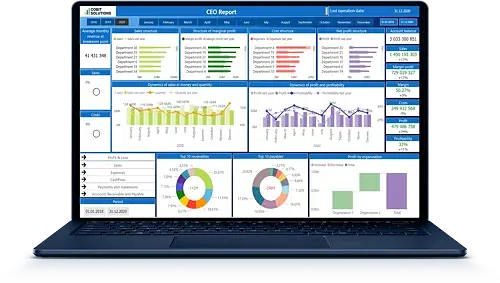Data Integration Consulting Services
When information is scattered across sources, businesses waste time on manual reconciliation, and managers miss chances for timely decisions. Our data integration consulting services help build unified architecture: convenient, stable, scalable.
Get an audit of IT infrastructure and selection of an integration model (API, ETL, cloud solution).
Setting up data exchange between ERP, CRM, e-commerce, BI systems.
Support, monitoring, and scaling of integrations in line with the company's growth.
for business intelligence succesfull implementation

By providing your phone number, you agree to receive SMS notifications. Your data will be processed in compliance with applicable privacy laws. For more information, please review our Privacy Policy. You may opt out at any time.
Benefits of Data Integration Services
Reliable Data and Compliance
Data integration works effectively when it is based on in-depth analysis. To ensure that data is consistent and processes are controlled, it is important to take into account not only technical but also business specifics. Data integration consulting helps to identify critical points, assess risks, and select solutions that ensure stability and compliance with regulations. This is especially valuable for companies that work with financial, medical, or other sensitive information.
Increased Efficiency & Streamlined Operations
Integration brings together disparate systems into a consistent environment where each process is supported by up-to-date data. Instead of duplication of actions and delays, there is a clear sequence that reduces time and resources. To achieve this, it is significant not only to connect systems, but also to choose the right data integration tools that fit the business structure. And experts can help you with this.
Enhanced Collaboration
When systems are not integrated, teams receive different or outdated information. Conversely, integration ensures data synchronization between departments and transparency in processes. For everything in the company to work stably, it is important to think through the logic of information exchange between departments at the design stage. A data integration specialist helps with this, taking into account the roles, access, and tasks of each team.
Smart Decision-Making
When financial, marketing, operational, analytical, and other critical data is scattered across different systems, managers often receive conflicting or outdated information. In such circumstances, it is difficult to act accurately and in a timely manner. We provide data integration services to combine key indicators in a single system. This allows you to quickly analyze the situation, respond to changes in a balanced manner, and make decisions that give your business a competitive advantage.
Rapid Market Entry and Business Expansion
When launching new products or expanding into new markets, businesses need to work together across departments, systems, and partners. A data integration consultant helps you build a flexible infrastructure that allows you to update information in real time, maintain stability under load, and scale confidently.
Risk Management & Cost Reduction
Data errors, delays in information processing, or manual duplication of processes lead to system failures, time loss, additional costs, and erroneous management decisions. However, we help companies build risk-free integration with clear process logic. To begin with, our data integration consultancy helps identify critical points where businesses lose resources. Then we focus on effective solutions so that you can optimize costs, improve the reliability of operations, maintain business stability, and even scale.

![Bar_Graph [:en]Bar_Graph[:]](https://cobit-solutions.com/en/wp-content/uploads/sites/2/elementor/thumbs/bar_graph-qrv612ip4pqc90u63or54m218fchkslmb6tlp2xpwc.png)
Streamline your data integration for Business Success
If you manage processes, make decisions, or are responsible for the stability of systems, you need a data integration service that allows you to synchronize information between services, harmonize formats, and take into account the load on channels. We customize the transfer so that data is transmitted accurately, processes work smoothly, and ultimately your management decisions are based on real indicators.
Our Data Integration Strategies:
Finding the Right Fit for Your Business
Each company has its own conditions: scale, internal structure, and technology stack. Therefore, we build our approach to integration in key areas:

By integration method
For some scenarios, streaming is appropriate, while for others, ETL or REST APIs are appropriate. The choice of architecture always depends on the volume, system load, and business sensitivity to failures in specific areas. Our team implements both basic integrations and high-load distributed systems.
By deployment model
Which model is better: cloud, on-premises, or mixed? With our extensive experience, our data integration experts help you choose the option that will really withstand the workload and stay within your budget.
By data storage type
Do you need speed, scalability, or archival reliability? We select the format according to the task: a database, a large-scale storage or an analytical platform. An experienced data integration engineer is responsible for the implementation.
By use case
Each industry has its own requirements for integration. In logistics, it is important to synchronize routes, warehouses, and orders in real time. In finance, it is the accuracy of reporting, regulatory compliance, and data control. In production, it is the coherence between procurement, production cycles, and control systems. It is in these nuances that the data integration meaning as a tool for managed business growth is revealed.


Our Approach to Data Integration
To ensure that data integration services deliver stable results, it is influential not only to set up the transfer of information, but also to think through the entire process — from the first assessment to further support. We work step by step, systematically, and taking into account the changes that occur in the business during development.
Assessment & Discovery Phase
- We audit IT infrastructure and exchange systems.
- We identify weaknesses in data processing and transmission.
- We formulate integration requirements based on business goals.
Strategic Integration Planning
- We choose the optimal method of data transfer (API, ETL, etc.).
- We design the architecture of interaction between systems.
- We assess the risks, scope of work, and implementation time.
Implementation & Quality Assurance
- We set up connections between platforms (ERP, CRM, e-commerce, BI).
- We check the accuracy, completeness, and stability of the exchange.
- We document solutions and train the team.
Ongoing Optimization & Support
- We monitor integration load and performance.
- We expand the solution in line with business changes.
- We provide technical support and updates.
Why We’re the Leading Data Integration Consulting Experts
We combine the approach of the best data integration consulting firms — in-depth assessment of processes and business goals — with practical implementation. We work systematically: we analyze, model, and implement solutions based on the business context.
Customized Solutions
- We study the internal structure of the company.
- We rely on practical solutions that have already been implemented in dozens of projects.
- We provide data integration engineering services, taking into account the specifics of the systems.
Expertise and Experience
- We combine technical and analytical competencies.
- We rely on practical solutions that have already been implemented in dozens of projects.
- We provide data integration engineering services, taking into account the specifics of the systems.
Improved Data Quality & Security
- We ensure data completeness, consistency of information between systems and its relevance.
- We comply with security requirements and data storage policies.
- We implement access control at the service level, depending on roles and authorities.
Faster Insights & Decision-Making
- We combine different sources of information into a single environment.
- We automate the flow of metrics into the appropriate BI systems for departments such as finance, marketing, sales, etc.
- We reduce the time from data collection to visualization.
Tools and Technologies We Rely On
We work with a wide range of modern solutions — from classic databases to cloud-based analytical platforms.
- We integrate data through REST APIs, GraphQL, webhooks, and build complex scenarios based on ETL and ELT pipelines.
- We use Power Automate, Apache Airflow, Talend, Fivetran, Make, Zapier to automate data exchange.
- Depending on the task, we use PostgreSQL, MySQL, MS SQL Server, MongoDB, BigQuery, Snowflake, or other storages.
- We implement visualization and analytics through Power BI, Looker, Tableau.
- For cloud integrations, we work with Azure Data Factory, AWS Glue, and Google Dataflow.
- If necessary, we create custom connectors for the client's internal systems.
Testimonials for Our Business Intelligence Services

Self-Storage Facilities in 6 countries
We want to express our sincere appreciation for all the support you’ve provided… From tackling urgent challenges like data upload to creating the initial flash report and making progress on complex issues; your contributions have been invaluable.
Julia MacDonald
Group FP&A Manager


FAQs
How can data integration enhance cross-departmental collaboration?
After the integration, data no longer needs to be manually sent to a specific department or transferred between tables. All teams work with synchronized information — in CRM, ERP, BI, or warehouse systems. This eliminates communication gaps and speeds up work.
How to choose the right integration strategy?
The choice of strategy depends on business goals, types of systems, and technical limitations. It is worth considering:
- what data sources and formats are used;
- how often information needs to be updated;
- whether processing (ETL/ELT) is required or whether APIs are sufficient;
- what cloud or local services are involved.
Based on this, we offer solutions ranging from data transfer via APIs to the development of a full-fledged data integration architecture.
Why does my business need data integration consulting?
The technical connection of systems is only part of the process. Without consulting, it’s easy to select the wrong method, the wrong tools, or not take into account the needs of the team. That is why companies work with data integration experts who take into account both business processes and technical details.
Consulting allows you to:
- identify critical points in the transfer and consistency of information;
- build the logic of exchange between ERP, CRM, BI and other services;
- eliminate duplication, losses, delays;
- adapt integration to real business processes.
How long does a typical data integration project take?
Usually, development takes from two weeks to several months, depending on the number of systems, the amount of data, and the type of integration. Quick cases are standard API connections. Complex cases include ETL processes, storage setup, and BI solutions.
How do you ensure data security during integration?
We work with proven platforms with built-in encryption. We also restrict access by role and data segment. And of course, we take into account storage and backup policies and control data transfer through secure channels (API, ETL/ELT). All in accordance with information security requirements and business specifics.













